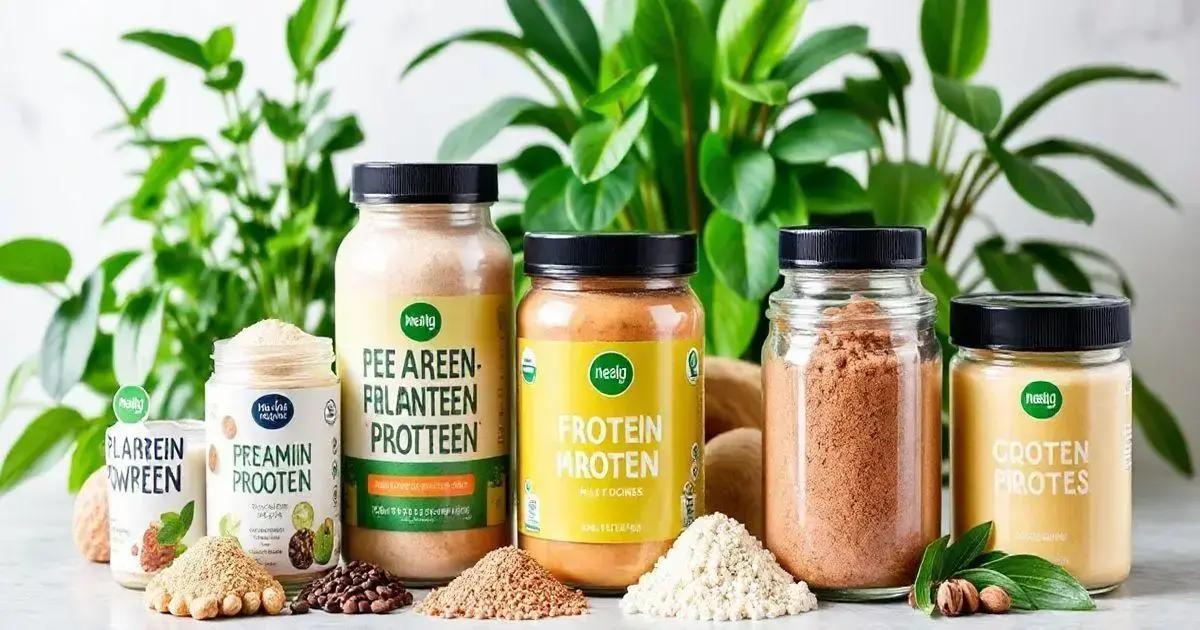Plant-based protein powders play a significant role in men’s fitness routines by offering benefits such as muscle recovery, weight management, and additional nutrients, while potential downsides include digestive issues and lower biological value. They can be easily integrated into diets through shakes, snacks, or baking, making them a versatile option for enhancing overall health and fitness.
Plant-based protein powders play a significant role in men’s fitness routines, offering a nutritious alternative to traditional protein sources. These powders, derived from peas, rice, and hemp, provide essential amino acids that support muscle growth and recovery. In this article, we will delve into what plant-based protein powders are, their benefits for fitness enthusiasts, tips on incorporating them into your workout regimen, and potential downsides to consider.
What Are Plant-Based Protein Powders?

Plant-based protein powders are dietary supplements made from various plant sources, such as peas, rice, soy, and hemp. They are available in different forms, including powders, bars, and shakes. These proteins provide essential amino acids that our bodies need for muscle repair and growth. Men looking to improve their fitness can benefit from incorporating these powders into their diet.
Types of Plant-Based Protein Powders
Common types of plant-based protein powders include:
- Pea Protein: Rich in branched-chain amino acids, this protein supports muscle building.
- Rice Protein: A complete protein when combined with other protein sources, it is easily digestible.
- Hemp Protein: Contains omega-3 fatty acids and fiber, making it a great choice for overall health.
These powders can easily be mixed into smoothies, oatmeal, or baked goods, providing a convenient source of protein without animal products.
Why Choose Plant-Based?
Men may choose plant-based protein powders for several reasons:
- They are often easier to digest compared to whey or casein proteins.
- They may have fewer allergens and irritants, making them suitable for those with lactose intolerance.
- They align with a growing preference for vegetarian or vegan diets.
Incorporating plant-based protein powders helps men support their fitness goals while also benefiting from the nutritional advantages of plant foods.
Benefits for Men’s Fitness

Plant-based protein powders offer numerous benefits for men’s fitness, making them an excellent addition to any workout regimen. First, they provide a high-quality protein source that supports muscle repair and growth. When consumed post-workout, these proteins help the body recover, allowing for better performance in subsequent workouts.
Supports Muscle Building
Plant-based proteins are rich in essential amino acids. These are vital for muscle synthesis. Consuming enough protein is essential for men looking to increase their muscle mass effectively.
Weight Management
Incorporating plant-based protein powders can assist in weight management by promoting satiety. Men often feel fuller for longer when they consume protein, which can reduce cravings and overall calorie intake.
Improved Nutritional Profile
Many plant-based protein powders come packed with additional nutrients such as fiber, vitamins, and minerals. These nutrients support overall health, which is critical for those who follow active lifestyles.
Boosting Metabolism
Higher protein intake has been shown to increase metabolism. By utilizing plant-based protein powders, men can enhance their metabolic rate, which aids in caloric burning during rest and exercise. This can lead to more effective weight loss and fitness results.
With these benefits, plant-based protein powders represent a powerful tool for men committed to their fitness journeys.
How to Incorporate into Workouts

Incorporating plant-based protein powders into your workouts can enhance performance and recovery. Here are some effective ways to do so:
Post-Workout Shakes
One of the easiest ways to consume plant-based protein powder is in a shake right after your workout. Combine a scoop of protein powder with your choice of almond milk, coconut water, or a smoothie made with fruits. This helps your body recover and rebuild muscle.
Mix into Pre-Workout Snacks
You can also add protein powder to your pre-workout snacks. Stir a scoop into yogurt or oatmeal for a nutrient boost. This will provide lasting energy during your exercise.
Baking and Cooking
Using plant-based protein powder in baking is another option. Add it to muffins, pancakes, or energy bars for a protein kick. This method makes it easy to incorporate protein into your daily meals.
Meal Replacement Smoothies
Consider making a meal replacement smoothie that includes plant-based protein powder, fruits, vegetables, and healthy fats, like avocado or nut butter. This provides a balanced meal rich in nutrients to fuel your fitness journey.
By including these methods, you can effectively use plant-based protein powders to enhance your workouts and overall fitness.
Potential Downsides of Plant-Based Proteins

While plant-based protein powders offer various benefits, there are also potential downsides to consider. Being aware of these can help men make informed dietary choices.
Digestive Issues
Some individuals may experience digestive discomfort when consuming plant-based protein powders. These can include bloating, gas, or stomach cramps. This is often due to the high fiber content or certain ingredients like inulin, which can be hard to digest for some.
Lower Biological Value
Compared to animal proteins, many plant-based proteins have a lower biological value. This means they may not provide as complete an amino acid profile. As a result, it’s essential to combine different protein sources to ensure adequate protein quality.
Allergies and Sensitivities
Some plant-based protein powders, like those made from soy or nuts, can trigger allergies or sensitivities. Men with known food allergies should read labels carefully and choose products that do not contain allergens.
Potential Additives
Many commercial plant-based protein powders may contain additives, sweeteners, and preservatives to enhance flavor or shelf life. These ingredients can detract from the health benefits of the protein powder and may not be suitable for everyone. Always choose products made with minimal, natural ingredients whenever possible.
By considering these potential downsides, men can make better choices when integrating plant-based protein powders into their diets.
Incorporating Plant-Based Protein Powders into Your Fitness Routine
Plant-based protein powders can play a significant role in enhancing men’s fitness routines. They offer a range of benefits, including muscle recovery, weight management, and improved overall health. It’s important to know how to integrate these protein sources effectively into your diet, whether through post-workout shakes, pre-workout snacks, or healthy meal replacements.
However, potential downsides, such as digestive issues, lower biological value, and possible allergens, should also be considered. By understanding both the advantages and disadvantages, men can make informed decisions about their protein sources.
Ultimately, when used wisely, plant-based protein powders can be a valuable addition to any fitness regimen, supporting goals for strength, endurance, and overall well-being.
FAQ – Frequently Asked Questions about Plant-Based Protein Powders in Men’s Fitness
What are plant-based protein powders?
Plant-based protein powders are supplements made from sources like peas, rice, and hemp, providing essential amino acids for muscle growth.
How do plant-based protein powders benefit men’s fitness?
They support muscle recovery, assist in weight management, and improve overall nutrition, making them a valuable addition to fitness routines.
How should I incorporate plant-based protein powders into my diet?
You can add them to post-workout shakes, pre-workout snacks, or use them in baking to enhance your protein intake in various meals.
Are there any downsides to using plant-based protein powders?
Potential downsides include digestive issues, lower biological value compared to animal proteins, and possible allergens in certain products.
Can I replace all my protein sources with plant-based powders?
It’s best to combine plant-based protein powders with other protein sources to ensure a complete amino acid profile and better nutritional balance.
Are plant-based protein powders suitable for everyone?
While many people can benefit from them, those with specific allergies or sensitivities should choose products carefully and consult a healthcare provider if unsure.













